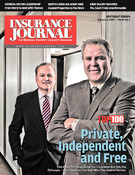One Employee’s Embezzlement Brought Others at Thomco Together and Taught This CEO About Leadership
A little more than 10 years ago, Greg Thompson, founder and CEO of the Georgia-based insurance services firm Thomco Inc., discovered his accounting manager was stealing money from the company. One day Thompson thought he had $300,000 in surplus; shortly thereafter a financial audit revealed the company’s bottom line was actually in negative territory — to the tune of $1.8 million.
“We were essentially insolvent,” Thompson explained at the Target Markets Program Administrators Association Annual Summit in Tempe, Ariz., in October. “I had signed personal indemnities to all of our carriers so I was personally bankrupt. … The company’s insolvent; I’m personally bankrupt. It doesn’t get a whole lot worse than that.”
But Thompson now believes that the worst things that happen can end up being the best, and that’s what occurred at Thomco.
On the advice of a friend, Thompson came clean with his employees about the embezzlement:
“I called everybody into the break room and basically said, ‘I’ve screwed up. If anybody wants to leave this company I don’t blame them. We’ve got serious financial problems. I will personally write a positive recommendation letter for another job, there will be no hard feelings, but I’ve got a plan, I think we can pull this out. It’s going to take a lot of hard work and we’ve got to pull together.'”
Amazingly, nobody left.
The challenge of turning the company around brought his employees together in a way that had never happened before.
“We started working really hard and some good things happened. … Within one year we pulled ourselves out,” Thompson said.
The company comeback taught the Georgia CEO lessons in leadership he has not forgotten.
First, Thompson became convinced that people perform their best when they feel they are part of a bigger cause. “Obviously you’re trying to make a profit, everybody knows that. But you have to have some vision of the company other than making the owner rich.”
Second, people are the greatest resource. “Unless they are committed to pushing the company forward, you are not going to be that successful. … The bigger you get, the less it depends on the CEO and owner, and the more it depends on those folks out there.”
“Those folks out there” deserve an employee compensation system that is fair and a system where job advancement is based on performance, not office politics. But a CEO must strive for more than fair compensation. The organization should be one that recognizes that employees want more than money; it should be one that inspires them to go the extra mile.
“People will commit when they feel recognized,” Thompson said. “Recognition is more important than compensation. That may be hard to believe but there are many examples of people leaving very high paying jobs where they were poorly recognized to go to jobs, maybe not as lucrative, where they did feel part of something bigger and they were recognized.”
CEOs must communicate regularly and openly. “This cannot be overstated. The bottom line is most people want to know where they stand. Most people will accept constructive criticism quite openly if you’re communicating with them regularly. People know that you’re seeing them … you’re giving them feedback.”
“Encourage constructive criticism,” Thompson said. “The companies that are the most successful are where the truth is on the table … especially in the senior management team. We even have an executive code…. One thing is go to the source: If you have a problem with somebody, go talk to them about it.”
According to the Thomco founder, the CEO is chief morale officer in an organization. “One thing that took me a long time to understand … was how much the CEO is looked at as a barometer of the organization,” he said. “If you’re looking down, if you’re looking worried, the company picks up on that.”
In addition, the CEO serves as the chief sales officer by having a visible presence with customers. “One thing I’ve discovered is, I’m not a particularly good sales person but I am the CEO,” Thompson said. When the CEO takes the time to meet with customers, it tells customers they are important.
Finally, Thompson said, leaders must be willing to get their hands dirty. If the CEO handles some of the tough jobs, then others will feel better about doing them. Some tough jobs shouldn’t be delegated. According to Thompson, if an insurance company has to be fired, that’s the CEO’s job. Also, if someone the CEO hired has to be let go, the CEO has to be a part of that, too.
Topics Georgia
Was this article valuable?
Here are more articles you may enjoy.


 Trapped Tesla Driver’s 911 Call: ‘It’s on Fire. Help Please’
Trapped Tesla Driver’s 911 Call: ‘It’s on Fire. Help Please’  Chubb CEO Greenberg on Personal Insurance Affordability and Data Centers
Chubb CEO Greenberg on Personal Insurance Affordability and Data Centers  Allstate Doubles Q4 Net Income While Auto Underwriting Income Triples
Allstate Doubles Q4 Net Income While Auto Underwriting Income Triples  The $3 Trillion AI Data Center Build-Out Becomes All-Consuming for Debt Markets
The $3 Trillion AI Data Center Build-Out Becomes All-Consuming for Debt Markets 


